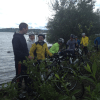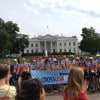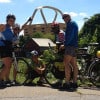Be there to meet our riders or join us for a celebratory BBQ dinner!


Be there to meet our riders or join us for a celebratory BBQ dinner!
Come join the Hazon Cross-USA riders for a free BBQ dinner at Agudas Achim! The Hazon Cross-USA riders will cycle from Springfield, OH to Columbus on August 6th. After settling in and showering (a must!), the riders will enjoy a wonderful BBQ dinner at 6:30 pm, sponsored by our ethically-produced kosher meat sponsor, Grow and Behold. And we hope you’ll join them! Please RSVP so we know how much food to make! You can also join us on the road! Ride with Hazon into Columbus, from Columbus to Coshocton, or any other part of the Ride until it ends in D.C. on August 15th. We encourage anyone riding for one day to donate $50 to Hazon to help support the educational work Hazon does in order to create a healthier and more sustainable Jewish community. A very special thank you to Agudas Achim for hosting our riders and helping to sponsor dinner. Our riders very much appreciate warm hospitality as they live a nomadic lifestyle for the summer.

The Hazon Cross-USA Ride travels from Twin Cities to Madison this week. See where it’s stopping!

The Hazon Cross-USA Ride travels from Aberdeen to Twin Cities this week. See where it’s stopping!

The Hazon Cross-USA Ride travels from Miles City to Aberdeen this week. See where it’s stopping!

The Hazon Cross-USA Ride travels to Miles City this week. See where it’s stopping!

The Hazon Cross-USA Ride travels from Seattle to Spokane this week. See where it’s stopping!

The Hazon Cross-USA Ride travels from Spokane to Helena this week. See where it’s stopping!
The Hazon Cross-USA Ride is an incredible and unique adventure. The Ride starts in Seattle on June 13th and ends in Washington, D.C. on August 16th, with riders joining and ending in various locations. Across the country, the riders and Hazon will be raising money and awareness about sustainability in our country- in both our transportation and food systems. In the next few weeks, Hazon staff will be in your community in the Midwest! Come enjoy cooking classes, Jewish learning, and social events – and hear how Hazon can enable you to make a difference while cycling across America. For more information about any program, contact adrienne.winton@hazon.org Join us in: Cleveland | Ann Arbor | Chicago | Columbus | Pittsburgh Cleveland Wednesday, February 20 – Beachwood Mandel JCC Hazon will be visiting the Beachwood Mandel JCC in the morning- come stop by and hear about an incredible Ride! Contact Bonnie Marks at 216 593 6201 for more information Time: 7:30 – 8:30 am Location: JCC Mandel | 26001 S Woodland Rd | Beachwood, OH 44122 Ann Arbor Wednesday, February 20 – University of Michigan Hillel Enjoy free snacks and learn about how sustainability and Judaism go hand-in-hand- and how you can […]
Hazon is looking to hire two crew members to help staff our Cross-USA Bike Ride this summer. The Ride begins in Seattle on June 10 and concludes nine weeks later in Washington DC on August 19, 2013. The Cross-USA Ride is a remarkable opportunity to travel across America for a summer as part of an intentional community. Our riders will be fundraising to support Hazon and advocating for transportation alternatives across the country. We will visit over 20 Jewish communities of all sizes, including three in Montana and one in South Dakota. During the Ride there will be ample educational opportunities to learn about America’s food systems, cycling advocacy, and Jewish tradition. While all riders are fundraising over $2000 to participate, crew will be encouraged to fundraise but do not have a fundraising minimum. Requirements Completed one year of college Experience living and working in a group setting Must have a valid driver’s license and be willing to drive a 15-passenger van or a 17’ box truck Knowledge of cycling, cooking, social media, community organizing, environmental education, Jewish ritual practice, photography, yoga, or other skills is a plus Willingness to become CPR certified, take a food safety class or learn bike […]
![[Cross-USA Ride] Participant Email August 21 gravel](https://hazon.org/wp-content/uploads/2012/05/gravel-100x100.jpg)
We’re thrilled that you joined us for the 2012 Hazon-Cross USA Ride and we are in awe of your ability to bike such a significant distance. We hope to see you back at future Hazon rides and events with your friends and family! This year, the Cross-USA Ride helped share Hazon’s work of creating healthier and more sustainable communities in the Jewish world and beyond with communities all across the country and we thank you for being part of this initiative. Ride fundraising is continuing through September and we hope that upon your return home, you continue to solicit donations as you share your experiences with friends and family. In the event that you earn any incentives from post-ride fundraising, we will be happy to mail your gift to you. Thank you again for helping to support Hazon and our work! Hazon’s Cross-USA Ride Staff This is the ninth email for Cross-USA Ride participants. If you’ve just registered, previous emails can be viewed here. (more…)

Our 10 cross-country cyclists and 60 others who joined along the way raised over $120,000 in support of sustainable food systems from over 1200 donors.
September 2012 Big Wheels Keep on Turning in the Jewish Exponent August 2012 65-year-old Newton woman bikes across USA in Wicked Local Hazon Cyclists Complete Ride in the Jewish Journal Ten weeks later, Hazon cyclists arrive in Washington, D.C. in JTNews in Washington Jewish cross-country bike riders finishing food awareness trek in DC in the Times of Israel Jewish Bicyclists Pedal to Promote Agricultural Sustainability in the Intelligencer, Wheeling News-Register Hazon cross-country bicyclists pass through Columbus in Ohio Jewish Chronicle [PDF] Hazon Cross-USA Ride combines Judaism, environment and cycling in The Jewish Chronicle of Pittsburgh Metro Briefs August 23 in The Jewish Chronicle of Pittsburgh Long schlep: Ten cyclists travel from Seattle to the District in the Washington Jewish Week [Video] Shalom TV Daily News Food activists finish cross-country ride on Jweekly.com Jewish cross-country bike riders finishing food awareness trek in DC in the Times of Israel Jewish cross-country bike riders finishing food awareness trek in D.C. in JTA Jewish cross-country bike riders finishing food awareness trek in D.C. in LA Jewish Journal Hazon brings its food message on wheels to Pittsburgh in The Jewish Chronicle Hazon Bikers Pedal Across the US in the NY Jewish Image Hazon Riders Spread Jewish […]

Be there to meet our riders or join us for a celebratory BBQ dinner!

This week, the ride began in Dayton, dipped into West Virginia, and ends in Pittsburgh.
